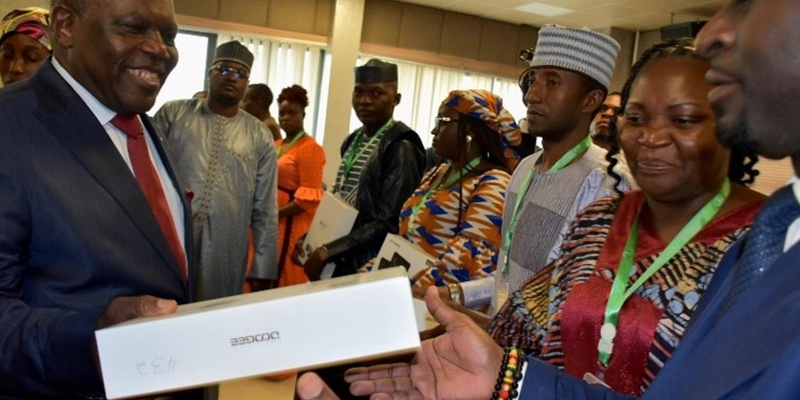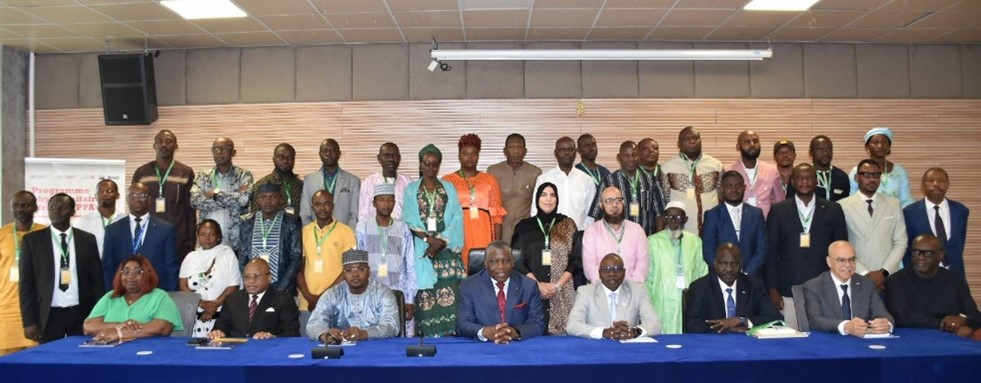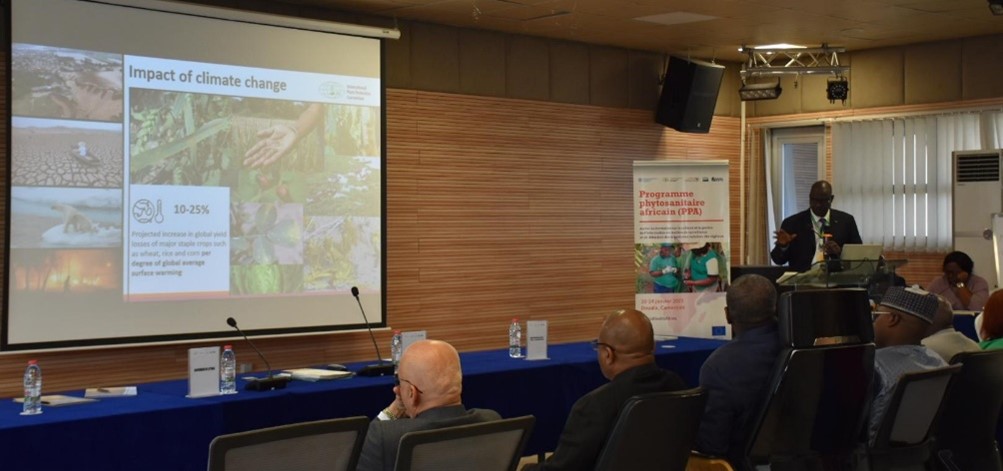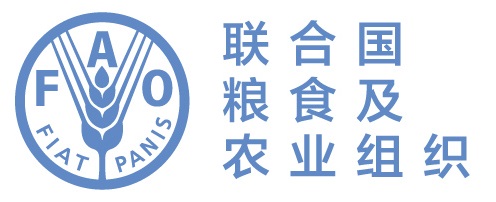加强非洲跨境病虫害防治能力
Posted on Tue, 21 Jan 2025, 07:19

喀麦隆农业与农村发展部长Gabriel Mbairobe(左)向一名培训学员移交平板电脑。平板电脑由美国农业部资助提供。©粮农组织/Gaelle NgandoMbaye
杜阿拉,2025年1月20日。来自五个非洲法语国家的植物健康官员目前正在接受为期一个星期的现代科学和数字工具培训,以加强有害生物监测和防控,防止有害生物暴发并保护植物资源。
此次题为“有害生物监测信息管理”的培训研讨会于2025年1月20日至24日在喀麦隆杜阿拉举行,将吸引来自喀麦隆、刚果民主共和国、几内亚比绍、马里和摩洛哥等国的60多名参与者。研讨会由国际植物保护公约(下称“IPPC”)秘书处组织,喀麦隆农业与农村发展部主办,并在欧盟的资助下,作为“非洲植物检疫计划”(下称“APP计划”)框架的一部分实施。“APP计划”由IPPC与联合国粮食及农业组织(下称“粮农组织”)、 非洲联盟委员会农业、农村发展、蓝色经济和可持续发展部以及美国农业部动植物卫生检验署(APHIS)合作实施。“APP计划”试点阶段涵盖11个国家;第二阶段将于2025年启动,新增8个国家。预计未来几年内,所有54个非洲国家都将加入该计划。
喀麦隆农业与农村发展部长Gabriel Mbairobe在研讨会开幕式上表示:“在非洲,有害生物对作物造成的损失在30%至60%之间,每年损失高达655亿美元。通过加强植检系统的韧性,各国可以防止有害生物进入或在其领土内传播。”
Gabriel Mbairobe部长还将由美国农业部资助提供的平板电脑正式移交至喀麦隆国家植物检疫技术人员手中。这些设备预装了在“APP计划”框架下开发的有害生物监测和报告工具。
防患于未然
学员将接受关于病虫害监测、样本采集、病例筛查、数据收集和灾情报告等方面的培训,重点关注实蝇、草地贪夜蛾和香蕉束顶病毒等有害生物。这些有害生物分别威胁芒果、玉米和香蕉等作物,影响粮食安全。例如,在马里,防控橘小实蝇(Bactrocera dorsalis)这一广泛分布的实蝇品种是芒果生产面临的最大挑战,而芒果是该国重要的出口产品。与此同时,草地贪夜蛾每年可导致12个非洲国家损失1770万吨玉米,造成数千万人粮食短缺。
学员将在培训过程中进行实地数据采集,并使用“APP计划”配备的地理信息系统(GIS)工具,以加强有害生物种群监测,从而优化响应计划和防控措施。此外,学员还将完成IPPC关于有害生物监测和国家报告义务的在线学习课程,进一步提升自身的专业知识。
适时干预 非洲有超过10亿人以农业为生,保护作物生产对于保障粮食安全和贸易至关重要。然而,《非洲植物健康战略》指出,非洲大陆在有害生物监测和植检协调方面存在技术能力不足的问题,从而无法对作物进行有效保护。
IPPC秘书处整合与支持组组长Arop Deng表示:“‘APP计划’将赋能植检官员,使其能利用先进科学和现代数字技术进行有效的有害生物监测和防控。”他同时还说:“‘APP计划’配备的各项工具将提升有害生物的有效防控能力,并确保国际植物检疫标准得到遵守。”
粮农组织驻喀麦隆代理代表Lassina Ouattara表示:“有害生物防控工作复杂且成本高昂,尤其是在有害生物已经定殖的情况下。非洲国家通常缺乏足够的技术能力和植检基础设施。因此,必须让这些国家能去积极地监测风险,并使用准确的诊断工具检测有害生物。”
非洲联盟泛非植物检疫理事会(AU-IAPSC)副协调员Sandrine Bayendi Loudit和近东植物保护组织(NEPPO)执行主任Mohamed Ben Jamaa也出席了开幕式。上述两大机构作为非洲的区域植物保护组织,构成“APP计划”运营协调工作组的重要组成部分,致力于加强区域植物健康合作。两位领导人都强调了合作的关键作用,并指出提高非洲植检能力对农业转型、经济增长和创造就业至关重要,尤其是在当前农产品贸易日益增长的大背景下。

©粮农组织/Gaelle NgandoMbaye

IPPC秘书处整合与支持组组长Arop Deng在会上强调“APP计划”的重要性。©粮农组织/Gaelle NgandoMbaye
关于粮农组织
联合国粮食及农业组织(粮农组织)是联合国的一个专门机构,领导国际社会为战胜饥饿而努力。粮农组织的目标是实现人人享有粮食安全,确保人们能够定期获得充足的优质食物,拥有积极健康的生活。粮农组织通过促进可持续生产和消费(包括保护全球植物)努力改造农食系统,以实现全球粮食安全。粮农组织在全球130多个国家开展工作,成员总数达195(194 个国家和欧盟)。
关于国际植物保护公约
《国际植物保护公约》(IPPC)是一项由185个缔约方(184 个国家和欧盟)批准的国际条约,旨在保护世界植物资源,防止有害生物传入和扩散,并促进贸易安全。各项《国际植物检疫措施标准》(ISPM)在IPPC的支持下制定,有助于各国执行国家植物检疫标准和进口要求。IPPC设在粮农组织总部,是全球唯一的植物健康标准制定机构。

